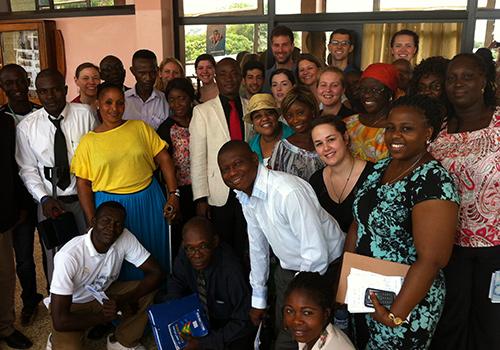Arcadia Class Makes Headlines in Sierra Leone

By CHRISTOPHER SARACHILLI ’14
In late spring, the Ministry of Youth Affairs in Sierra Leone hosted Arcadia University students in Freetown, the nation’s capital, garnering notice in local newspapers such as The Exclusive and The Awareness Times, as well as on the country’s national television station. Students traveled to the West African country from May 25 to June 5 as part of Beyond Conflict in Sierra Leone, a Global Field Study course taught by Associate Professor Dr. Jennifer Riggan and Fodeba Daboh ’11M, a graduate of Arcadia’s International Peace and Conflict Resolution program. They studied youth unemployment with a focus on disabled youth.
The trip, the first time an Arcadia class has traveled to Sierra Leone, comes as the most recent step in an ongoing effort to establish stronger relationships with Fourah Bay College at the University of Sierra Leone and other institutions in the country, including the Ministry of Youth Affairs, the nonprofit Heifer International, and One Family People, a local grassroots organization devoted to advocating for the country’s disabled. They also worked with Daboh’s own NGO, Help to Engage and Lead (HEAL) Sierra Leone.
“One of the great things about the students going to Sierra Leone is that they speak with ministers,” explained Dr. Warren Haffar, dean of International Affairs at Arcadia. “Within one day, you can talk to the Minister of Youth Affairs and then go out and see the actual work that they’re doing and the challenges they face.”
In addition to the Minister of Youth Affairs, students met with the Minister of Social Welfare, Gender and Children’s Affairs; the Ministry of Education; the National Commissioner for Disabilities; members of the Parliamentary Committee on Youth Affairs; and several NGOs and Civil Society Organizations.
They also spoke to the youth themselves—students at Fourah Bay College and participants in One Family People’s programs. Arcadia students discovered the challenges those youth face, particularly a lack of work. Some fear that rampant youth unemployment, estimated at around 60 percent, could lead to more violence and instability. Further, many of the unemployed suffer from disabilities, adding social stigma and physical handicap to the already difficult task of finding work.
While the class expected to speak mostly with war-affected youth, they found that the disabilities were attributed not only to the conflict. In fact, those disabled from birth or by accident or disease seemed to outnumber the war-affected youth. The emphasis on broader issues of development, rather than just conflict, is a striking change from what Arcadia teams have found on their trips to the country in past years. Riggan and Daboh believe it is a sign of growth.
“The country is making a shift away from thinking of itself as a post-conflict country,” Riggan said. “It’s really trying to forge a working democracy, and the people are doing their best to look out for each other. Civil society is tremendously active and working to hold government accountable.“
Even in the face of daunting challenges like widespread poverty and a lack of unity within the government, Sierra Leoneans have hope.


